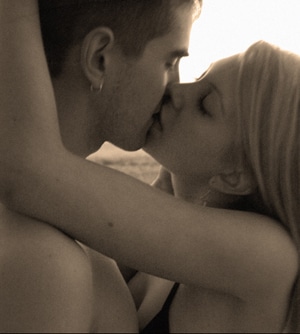
To me, I remember going on one of my first dates after I’d left school and this guy asked me for a drink. So I met him down the pub and we sort of held hands for a bit and then we walked down to the bus stop, hoping that the bus wouldn’t come for at least ten minutes.
Then we’d kiss with so much passion and feeling, that emotion and hormones were just buzzing around everywhere.
Pecking, smooching and playing tonsil-hockey…there are as many names for kissing as there are ways to do it.
Whether we use it as an informal greeting or an intensely romantic gesture, kissing is one of those ingrained human behaviours that seem to defy explanation. Its many purposes, a blow and peck for good luck on dice, lips to ground after a rocky boat ride, kisses in the air to an acquaintance, and the long slow smooches of Hollywood—have different meanings yet are similar in nature. So why is it that we love to pucker up?
Philematologists, the scientists who study kissing, aren’t exactly sure why humans started locking lips in the first place. The most likely theory is that it stems from primate mothers passing along chewed food to their toothless babies. The lip-to-lip contact may have been passed on through evolution, not only as a necessary means of survival, but also as a general way to promote social bonding and as an expression of love.
But something’s obviously happened to kissing since the time of the chewed-food pass. Now, it’s believed that kissing helps transfer critical information, rather than just meat bits. The kissing we associate with romantic courtship may help us to choose a good mate, send chemical signals, and foster long-term relationships. All of this is important in evolution’s ultimate goal—successful procreation.
Kissing allows us to get close enough to a mate to assess essential characteristics about them, none of which we’re consciously processing. Part of this information exchange is most likely facilitated by pheromones, chemical signals that are passed between animals to help send messages. We know that animals use pheromones to alert their peers of things like mating, food sources, and danger, and researchers hypothesize that pheromones can play a role in human behavior as well. Although the vomeronasal organs, which are responsible for pheromone detection and brain function in animals, are thought to be vestigial and inactive in humans, research indicates we do communicate with chemicals.
Behavioral research supports this biological reasoning. In 2007, researchers at University of Albany studied 1,041 college student and found significant differences in how males and females perceived kissing. Although common in courtship, females put more importance on kissing, and most would never have sex without kissing first. Men, on the other hand, would have sex without kissing beforehand; they would also have sex with someone who wasn’t a good kisser. Since females across species are often the choosier ones when it comes to mate selection, these differences in kissing behavior make sense.
Men are also more likely to initiate French kissing and researchers hypothesize that this is because saliva contains testosterone, which can increase libido. Researchers also think that men might be able to pick up on a woman’s level of estrogen, which is a predictor of fertility.
One of the best things about kissing, however, is that we don’t have to think about any of this. Just close eyes, pucker up, and let nature takes its course.
by Susan Floyd


